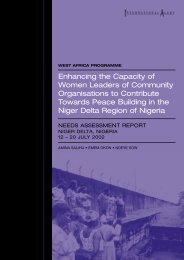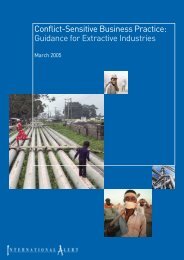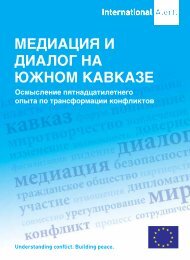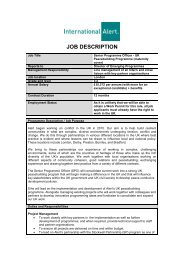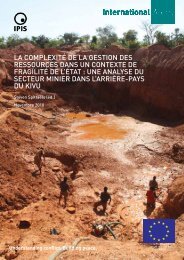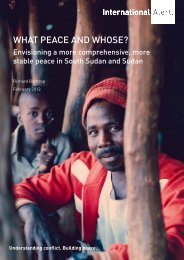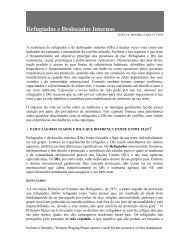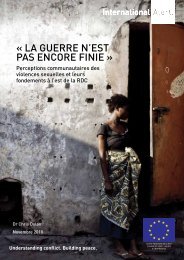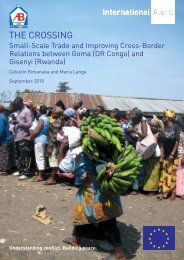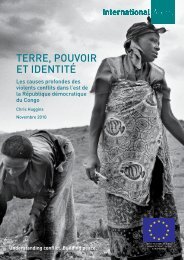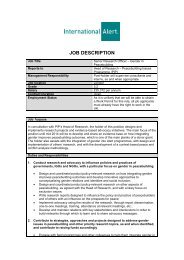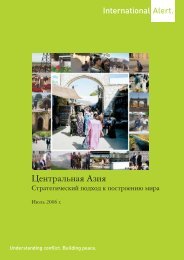Walking in the Dark: informal Cross-border trade ... - International Alert
Walking in the Dark: informal Cross-border trade ... - International Alert
Walking in the Dark: informal Cross-border trade ... - International Alert
Create successful ePaper yourself
Turn your PDF publications into a flip-book with our unique Google optimized e-Paper software.
<strong>Walk<strong>in</strong>g</strong> <strong>in</strong> <strong>the</strong> <strong>Dark</strong>: Informal <strong>Cross</strong>-<strong>border</strong> Trade <strong>in</strong> <strong>the</strong> Great Lakes Region<br />
43<br />
more widespread than formal taxes. 154 The fragility of <strong>the</strong> state <strong>in</strong> DRC, and to a lesser extent <strong>in</strong><br />
Burundi, creates a situation whereby many different taxes operate alongside one ano<strong>the</strong>r and are<br />
collected by a large number of state officials; this steers small <strong>trade</strong>rs towards strategies to avoid<br />
and/or negotiate taxes.<br />
Fur<strong>the</strong>rmore, <strong>the</strong> high rates of formal taxation are excessive when compared to <strong>the</strong> <strong>trade</strong>rs’<br />
f<strong>in</strong>ancial means and encourage <strong>the</strong> adoption of tax avoidance strategies. Although <strong>the</strong>se may<br />
provide <strong>trade</strong>rs (but not <strong>the</strong> state) with an advantage <strong>in</strong> <strong>the</strong> short term, <strong>the</strong>y are essentially ak<strong>in</strong><br />
to a “devil’s deal” – with negative consequences. For example, <strong>trade</strong>rs often hire transporters<br />
to act as <strong>in</strong>termediaries with a view to negotiat<strong>in</strong>g a reduction <strong>in</strong> taxes. Such dependency on<br />
middlemen <strong>in</strong>creases risks, as an <strong>in</strong>termediary may disappear with <strong>the</strong> <strong>trade</strong>r’s goods or even<br />
act as an <strong>in</strong>formant. The high levels of taxes also encourage a certa<strong>in</strong> number of <strong>trade</strong>rs to<br />
use smuggl<strong>in</strong>g routes to cross <strong>the</strong> <strong>border</strong>, thus expos<strong>in</strong>g <strong>the</strong>m to significant risks. Even more<br />
important is <strong>the</strong> fact that <strong>trade</strong>rs feel <strong>the</strong>y are sav<strong>in</strong>g money by pay<strong>in</strong>g <strong>in</strong>formal taxes, when<br />
<strong>in</strong> many cases <strong>the</strong>y are not legally obliged to pay <strong>the</strong>m. Certa<strong>in</strong> <strong>in</strong>dividuals (such as military<br />
personnel <strong>in</strong> DRC and Burundi) are not authorised to collect taxes, and <strong>in</strong> o<strong>the</strong>r cases national<br />
regulations (customs codes or various tax rates) are ignored. This situation is, above all, due to<br />
a lack of awareness among <strong>trade</strong>rs about <strong>the</strong>ir rights, as well as <strong>the</strong> power imbalance between<br />
<strong>trade</strong>rs and state officials. Traders are forced to ‘walk <strong>in</strong> <strong>the</strong> dark’ 155 with no <strong>in</strong>formation about<br />
<strong>the</strong>ir rights or responsibilities. What is more, <strong>the</strong> weak powers of associations and cooperatives<br />
do not allow <strong>the</strong>m to heighten <strong>the</strong>ir collective capacity for effective negotiation or streng<strong>the</strong>n <strong>the</strong>ir<br />
comb<strong>in</strong>ed voice. On <strong>the</strong> rare occasions when <strong>the</strong>ir rights are defended, it is <strong>the</strong> result of <strong>in</strong>formal<br />
negotiations and relationships; <strong>the</strong>se are personal and not last<strong>in</strong>g. However, as one Congolese<br />
customs official po<strong>in</strong>ted out: ‘If <strong>the</strong>y persisted <strong>the</strong>y could put pressure on <strong>the</strong> relevant authorities.<br />
[...] But <strong>the</strong>y are not aware of <strong>the</strong> rules and have no <strong>in</strong>fluence’. 156<br />
One of <strong>the</strong> biggest challenges is <strong>the</strong>refore to help <strong>trade</strong>rs leave <strong>the</strong> <strong>in</strong>formal economy and<br />
progressively enter official channels. However, <strong>in</strong> order to achieve this objective, we must first<br />
understand <strong>the</strong> reasons why <strong>trade</strong>rs cont<strong>in</strong>ue to operate <strong>in</strong>formally. The primary factor is <strong>the</strong><br />
number of different taxes and <strong>the</strong> high rates to be paid, both under <strong>the</strong> <strong>in</strong>formal and formal systems.<br />
First of all, regional agreements on this issue must be respected and implemented. Secondly,<br />
significant efforts are required to reduce <strong>the</strong> number of <strong>in</strong>formal taxes. F<strong>in</strong>ally, taxation rates<br />
must be adjusted to <strong>the</strong> economic means of <strong>the</strong> <strong>trade</strong>rs affected. As we have already emphasised,<br />
cross-<strong>border</strong> <strong>trade</strong> plays an important role <strong>in</strong> <strong>the</strong> survival of many families and <strong>in</strong> <strong>the</strong> fight aga<strong>in</strong>st<br />
poverty. National policies <strong>in</strong> <strong>the</strong> region treat taxation and <strong>the</strong> fight aga<strong>in</strong>st poverty almost as if<br />
<strong>the</strong>y were separate entities, yet <strong>in</strong> terms of cross-<strong>border</strong> <strong>trade</strong> <strong>the</strong>y should be addressed toge<strong>the</strong>r.<br />
In order to promote cross-<strong>border</strong> <strong>trade</strong> and reduce poverty, measures need to be taken, such as<br />
tax cuts for small quantities of goods, access to micro-credit, and organisational support for<br />
bodies represent<strong>in</strong>g <strong>trade</strong>rs. Such measures would not only be advantageous for <strong>trade</strong>rs but would<br />
enable <strong>the</strong> development of each country as a whole.<br />
8.1 Recommendations for governments <strong>in</strong> <strong>the</strong> region<br />
As discussed above, taxes are seen as <strong>the</strong> biggest problem fac<strong>in</strong>g <strong>trade</strong>rs. A reduction <strong>in</strong> taxes,<br />
<strong>the</strong> abolition of <strong>in</strong>formal taxes and a reduction <strong>in</strong> <strong>the</strong> number of services operat<strong>in</strong>g on <strong>the</strong> <strong>border</strong><br />
should all be central to <strong>the</strong> solutions put <strong>in</strong> place for <strong>trade</strong>rs.<br />
Abolish <strong>in</strong>formal taxes and <strong>in</strong>crease transparency: some public officials are <strong>in</strong>volved <strong>in</strong> <strong>the</strong> collection<br />
of <strong>in</strong>formal and illegal taxes at <strong>the</strong> <strong>border</strong>. This is particularly true <strong>in</strong> DRC and Burundi. In concrete<br />
154 As confirmed on <strong>the</strong> Congolese <strong>border</strong> <strong>in</strong> Bukavu and Uvira, where 55 and 79 percent respectively of <strong>trade</strong>rs pay <strong>in</strong>formal taxes.<br />
155 Interview with a Ugandan female <strong>trade</strong>r, Arua, 3rd March 2011.<br />
156 Interview with OCC official, Uvira, 17th October 2011.



